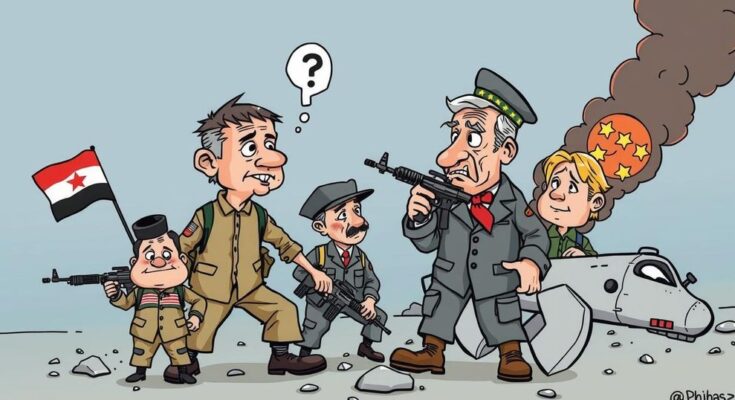Qatari media has published numerous anti-U.S. cartoons that accuse the United States of complicity in Israel’s actions in Gaza. These illustrations depict the U.S. as a demonic force, suggesting its direct responsibility for the humanitarian crisis. Such sentiments are echoed in various articles, underscoring deep anti-American feelings within this narrative, making the United States a focal point of criticism in the context of Middle Eastern conflicts.
In recent months, Qatari media outlets have markedly intensified their anti-U.S. rhetoric through a series of cartoons that vilify and mock the United States. These illustrations assert that the U.S. is complicit in Israel’s ongoing military actions in Gaza by providing unwavering support through military, political, and legal means. Some depictions suggest that Israel exercises control over the U.S., highlighting a narrative of manipulation and dominance. The portrayal of the United States in these works is alarming; it is commonly depicted as a demonic force orchestrating chaos globally while caricatures of U.S. politicians are rendered as malevolent creatures, displaying evident culpability in the Gaza conflict. Various cartoons explicitly illustrate the perceived complicity of the U.S. in Israel’s operations, suggesting a collaboration that fuels the violence in Gaza. For instance, the imagery often depicts U.S. leaders directly participating in the assaults on Gaza, reinforcing the notion that the U.S. shares responsibility for the humanitarian crisis. The Qatari press further amplifies these sentiments through vehement criticism, labeling the U.S. as “the cursed Uncle Sam” and identifying it as a “main source of terrorism.” Articles have even expressed desires for military confrontations involving U.S. forces, reflecting a drastic call to action against perceived aggressors. This report delves into the vast array of cartoons published in the Qatari media, demonstrating a concerted campaign aimed at belittling the United States while placing blame for the violence in Gaza squarely on its shoulders. The anti-U.S. sentiment runs deep, as evidenced by numerous illustrations depicting America as not just an ally, but a facilitator of the violence perpetrated against Palestinians.
In the context of ongoing conflict in Gaza, Qatari media has taken a vehement stance against the United States, positioning it as a primary antagonist in the situation. This has manifested through editorial cartoons and articles that not only criticize U.S. foreign policy but depict it as a driving force behind the suffering in Gaza. The intense criticism is part of a broader media strategy reflecting Qatar’s political alignment and its stance on the Arab-Israeli conflict. Understanding this media response is crucial to comprehending the tension surrounding U.S. involvement in Middle Eastern geopolitics, particularly regarding portrayals of Israel and its actions against Palestinians.
In summary, the Qatari media’s portrayal of the United States through aggressive and confrontational cartoons serves to frame it as a central figure in the violence and humanitarian crisis occurring in Gaza. By characterizing the U.S. as a malevolent force complicit in Israel’s actions, Qatari outlets seek to rally public sentiment against America and compel a reevaluation of its role and responsibilities in the Middle East. The relentless demonization and the expression of hostility reflect deep-seated grievances and aspirations for regional autonomy from perceived Western influence.
Original Source: www.memri.org




